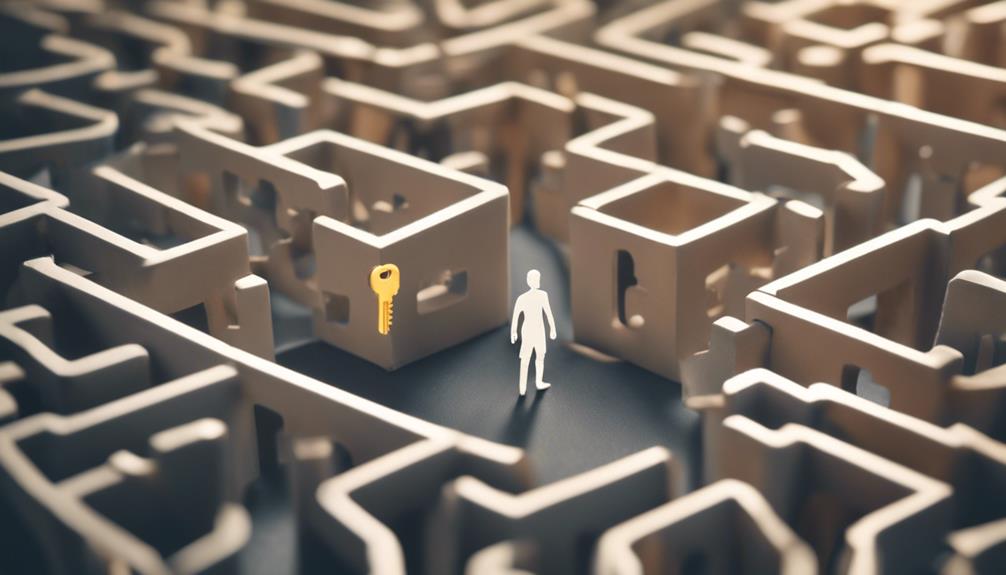The Key to Effective Stress Management Techniques
You might think that managing stress is easier said than done, but it doesn't have to be overwhelming. Understanding the key principles of effective stress management is the first step towards a healthier, more balanced life.
By exploring various techniques and strategies, you can discover what works best for you to navigate life's challenges with grace and resilience.
Stay tuned to uncover practical tips that can help you regain control and find peace in the midst of chaos.
Key Takeaways
- Practice mindfulness for stress relief and increased awareness.
- Prioritize self-care through exercise, sleep, nutrition, and boundaries.
- Adopt healthy lifestyle habits for overall stress reduction.
- Utilize relaxation techniques, positive thinking, problem-solving, and work-life balance strategies.
Understanding Stress
If you've ever felt overwhelmed, anxious, or unable to cope with life's demands, you're likely experiencing stress. Stress can be caused by various factors such as work pressure, financial issues, relationship problems, or health concerns.
The effects of stress can manifest in both physical and mental ways. Physically, stress can lead to headaches, muscle tension, fatigue, and even digestive problems. Mentally, stress can cause feelings of anxiety, irritability, sadness, or difficulty concentrating.
Understanding the causes and effects of stress is the first step towards managing it effectively.
Building Resilience
Building resilience is essential in effectively managing stress and overcoming life's challenges. Resilience building involves developing the ability to adapt and bounce back from adversity, strengthening your stress tolerance. By enhancing your resilience, you can navigate through difficult situations with more ease and confidence. Here are some key strategies to help you build resilience:
| Resilience Building Strategies | Description | Benefits |
|---|---|---|
| Cultivate a Growth Mindset | Embrace challenges as opportunities for growth. | Promotes learning and development. |
| Develop Strong Support Networks | Surround yourself with positive and supportive individuals. | Provides emotional reinforcement during tough times. |
| Practice Self-Care | Prioritize your physical, emotional, and mental well-being. | Enhances overall resilience and stress management. |
| Set Realistic Goals | Break tasks into manageable steps and celebrate achievements. | Builds confidence and motivation. |
| Maintain a Positive Outlook | Focus on silver linings and possibilities in challenging situations. | Increases optimism and resilience in the face of adversity. |
Practicing Mindfulness
To effectively manage stress and enhance your overall well-being, incorporating mindfulness practices into your daily routine can be highly beneficial. Being mindful involves paying attention to the present moment without judgment.
Here are some ways you can integrate mindfulness into your life:
- Practice Mindful Eating: Engage all your senses while eating. Notice the colors, textures, flavors, and smells of your food. Eat slowly and savor each bite.
- Focus on the Present Moment: Let go of worries about the past or future. Instead, concentrate on what you're doing right now. Whether it's washing dishes, walking, or talking to a friend, be fully present.
- Mindful Breathing: Take a few moments to focus on your breath. Feel the air entering and leaving your body. This simple practice can help calm your mind and body.
- Body Scan Meditation: Close your eyes and bring your attention to different parts of your body, starting from your toes and moving upwards. Notice any sensations without trying to change them.
- Mindful Listening: When in conversation, give the speaker your full attention. Listen without interrupting or planning your response.
Incorporating these mindfulness practices can help you cultivate a sense of peace and clarity in your daily life.
Prioritizing Self-Care
Now, let's shift our focus to prioritizing self-care, a crucial aspect of maintaining your overall well-being and effectively managing stress levels. Taking time for self-care is not selfish; it is essential for your mental, emotional, and physical health. By incorporating self-care routines and self-love practices into your daily life, you can recharge and build resilience to face life's challenges.
| Self-Care Routines | Self-Love Practices |
|---|---|
| Exercise regularly | Practice gratitude |
| Get enough sleep | Engage in hobbies |
| Eat nutritious meals | Set boundaries |
| Spend time in nature | Practice mindfulness |
Self-care routines can include activities like exercise, getting enough sleep, eating well, and spending time in nature. Additionally, self-love practices such as gratitude, engaging in hobbies, setting boundaries, and mindfulness can significantly impact your well-being. Remember, prioritizing self-care is not a luxury but a necessity for leading a balanced and fulfilling life. Take the time to nurture yourself, for you deserve to feel your best.
Setting Boundaries
Setting boundaries is a fundamental practice that empowers you to safeguard your well-being and uphold your personal limits in various aspects of your life. It's crucial to establish clear boundaries to protect your mental and emotional health. Here are some key points to consider when setting boundaries:
- Define Your Limits: Take time to reflect on what you're comfortable with and what crosses the line for you.
- Communicate Clearly: Express your boundaries assertively and respectfully to others.
- Learn to Say No: Understand that saying no isn't selfish but necessary for self-care.
- Prioritize Yourself: Make self-care a priority by setting aside time for activities that rejuvenate you.
- Evaluate Relationships: Assess the impact of your boundaries on your relationships and adjust where needed.
Healthy Lifestyle Habits
Establishing healthy lifestyle habits is essential for maintaining optimal physical and mental well-being. Your nutrition choices play a crucial role in how you feel each day. Opt for whole, nutrient-rich foods to fuel your body and mind effectively.
Incorporate exercise routines that you enjoy to keep your body active and release endorphins that combat stress. Quality sleep is non-negotiable; ensure you get enough rest to rejuvenate your body and mind.
Prioritize stress reduction techniques such as mindfulness, deep breathing, or engaging in hobbies you love. By taking care of your body through these habits, you empower yourself to better cope with daily stressors.
Time Management Strategies
To effectively manage your time, prioritize tasks based on their importance and deadlines. Task prioritization is key to ensuring you focus your energy on what truly matters.
Here are some strategies to help you make the most of your time:
- Create a to-do list: Jot down all tasks and categorize them based on urgency and significance.
- Set SMART goals: Define Specific, Measurable, Achievable, Relevant, and Time-bound objectives to give your day direction.
- Use time-blocking: Allocate specific time slots for different activities to enhance productivity.
- Eliminate distractions: Identify and remove anything that hinders your focus, allowing you to work more efficiently.
- Learn to say no: Prioritize your own commitments and don't overextend yourself by taking on too much.
Seeking Support Systems
When feeling overwhelmed, seeking out support systems can provide a valuable outlet for sharing your burdens and gaining perspective on managing stress effectively.
Peer counseling offers a safe space to express your feelings and receive guidance from someone who understands what you're going through.
Connecting with others facing similar challenges in group therapy can also be incredibly beneficial. Sharing experiences and coping strategies in a group setting not only helps you feel less alone but also provides an opportunity to learn from each other's successes and setbacks.
Relaxation Techniques
Looking to unwind and relieve stress in a healthy way? Here are some relaxation techniques that can help you find peace amidst the chaos of everyday life:
- Deep Breathing: Take slow, deep breaths to calm your mind and body. Inhale deeply through your nose, hold for a few seconds, and exhale slowly through your mouth.
- Progressive Muscle Relaxation: Start by tensing and then slowly releasing each muscle group in your body, from head to toe. This technique can help release physical tension and promote relaxation.
- Guided Imagery: Visualize a peaceful place or scenario to transport your mind away from stress and into a state of tranquility.
- Mindfulness Meditation: Focus on the present moment without judgment. Pay attention to your thoughts and sensations without getting caught up in them.
- Yoga: Combine gentle movements with deep breathing to relieve tension and promote relaxation in both the body and mind.
These techniques can be powerful tools in your arsenal for combating stress and finding inner peace. Take some time for yourself and experiment with these methods to discover what works best for you.
Positive Thinking
Feeling overwhelmed by stress can sometimes cloud your perspective, but practicing positive thinking can help shift your mindset towards a more optimistic outlook on life. When stress seems insurmountable, turning to gratitude journaling can be a powerful tool. Take a few moments each day to reflect on things you're grateful for; this practice can foster a sense of appreciation and shift your focus from negativity to positivity.
In addition to gratitude journaling, mental reframing is essential. Challenge negative thoughts by reframing them in a more positive light. Replace 'I can't do this' with 'I will do my best and learn from the experience.' Affirmations and visualization techniques are also valuable. Repeat positive affirmations to yourself daily, such as 'I am capable and strong.' Visualize yourself overcoming challenges and achieving your goals; this can help manifest a more positive reality.
Problem-Solving Skills
To enhance your ability to navigate through stressful situations effectively, developing strong problem-solving skills is crucial. When faced with challenges, having the capacity for critical thinking and decision making can make a significant difference in how you manage stress. Here are some tips to help you enhance your problem-solving skills:
- Practice active listening to fully understand the issue at hand.
- Break down complex problems into smaller, more manageable parts.
- Brainstorm potential solutions without self-judgment.
- Evaluate the pros and cons of each solution before making a decision.
- Learn from past experiences to improve your problem-solving approach.
Creating Healthy Work-Life Balance
Enhancing your problem-solving skills can also contribute to creating a healthy work-life balance by equipping you with the tools needed to effectively address any challenges that may arise. When considering time allocation, prioritizing tasks based on importance and deadlines can help you manage your workload efficiently. By setting boundaries and learning to say no when necessary, you can safeguard your personal time and prevent work from encroaching on your family time.
Family time is crucial for maintaining a healthy work-life balance. Planning dedicated moments with your loved ones not only strengthens your relationships but also provides a source of support and happiness outside of work. Incorporating activities that promote bonding and relaxation can help you unwind and recharge, allowing you to return to work feeling refreshed and focused.
Frequently Asked Questions
How Can Stress Management Techniques Be Tailored to Fit Different Personality Types?
When tailoring stress management techniques to different personality types, it's crucial to understand individual coping strategies. By recognizing unique traits and preferences, you can customize approaches that resonate with each person's needs and empower effective stress relief.
Are There Any Cultural or Societal Factors That Can Impact an Individual's Ability to Effectively Manage Stress?
In some cultures, seeking help for mental health challenges may be stigmatized, impacting your ability to utilize social support. Resilience factors like community ties and coping strategies may vary based on cultural norms, influencing stress management effectiveness.
Can a Person's Past Experiences or Traumas Affect Their Response to Stress and the Effectiveness of Stress Management Techniques?
Your past experiences, especially childhood trauma, can deeply influence how you respond to stress. Identifying emotional triggers and developing coping strategies are crucial for building resilience and effectively managing stress. Your journey matters.
Is There a Specific Age Group That May Benefit More From Certain Stress Management Techniques?
When considering age groups and techniques for stress management, it's important to tailor strategies to benefit different demographics. By understanding the unique needs of each group, you can offer targeted support and empower individuals to thrive.
How Can Environmental Factors, Such as Noise Pollution or Air Quality, Play a Role in Stress Management and Overall Well-Being?
In your daily life, environmental factors like noise pollution and air quality can significantly impact your stress levels. Nature therapy and mindfulness practices, along with thoughtful urban planning and workplace wellness initiatives, can help improve your overall well-being.
Conclusion
In conclusion, remember that Rome wasn't built in a day, and neither is effective stress management. By understanding stress, building resilience, and prioritizing self-care, you can create a healthy work-life balance.
Practice mindfulness, set boundaries, and use relaxation techniques to combat stress. With positive thinking, problem-solving skills, and a focus on self-care, you'll be well on your way to managing stress effectively.
Keep pushing forward, one step at a time, and you'll conquer stress in no time.















